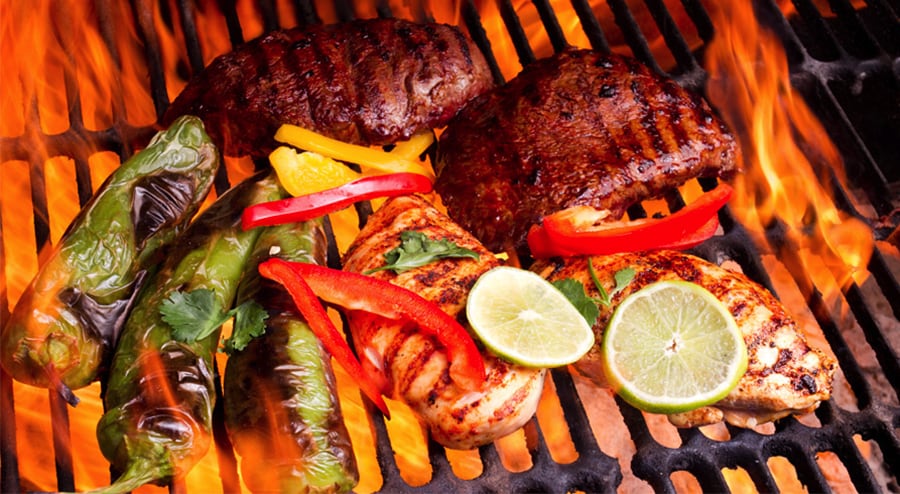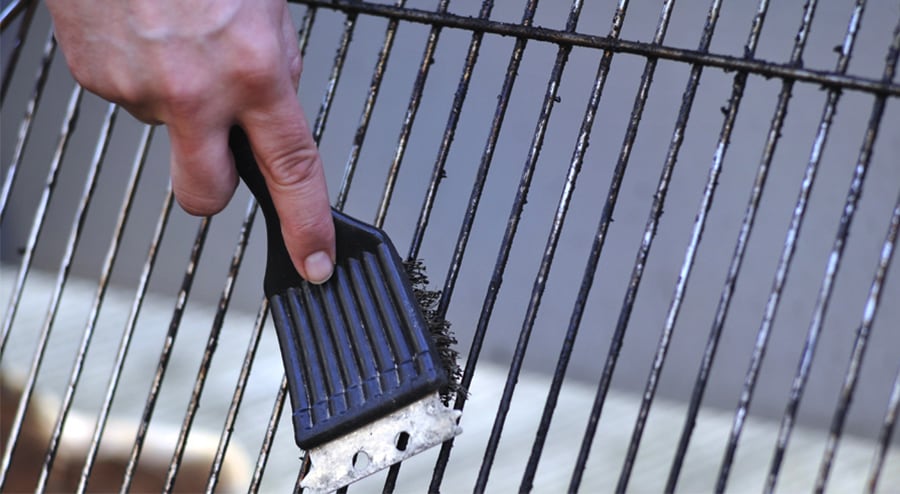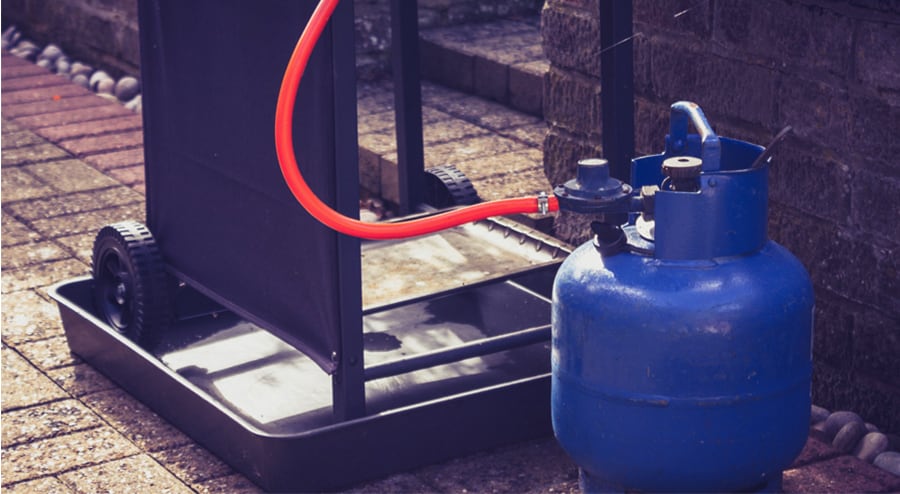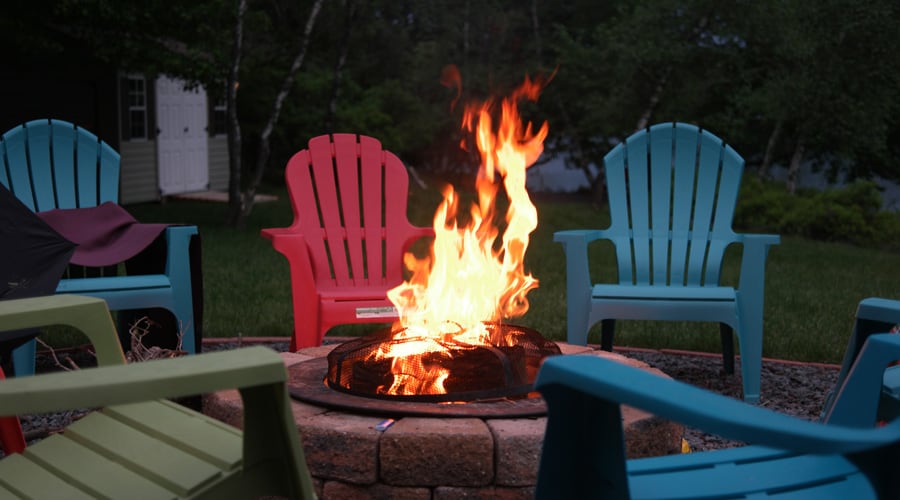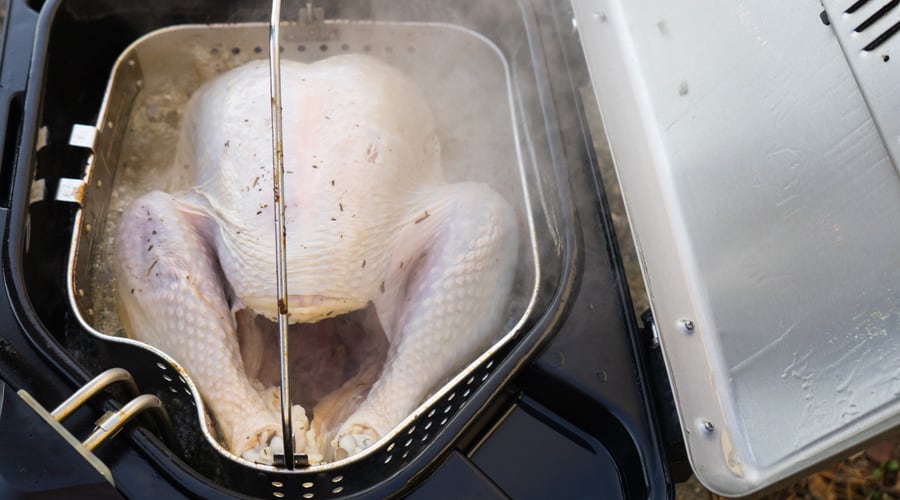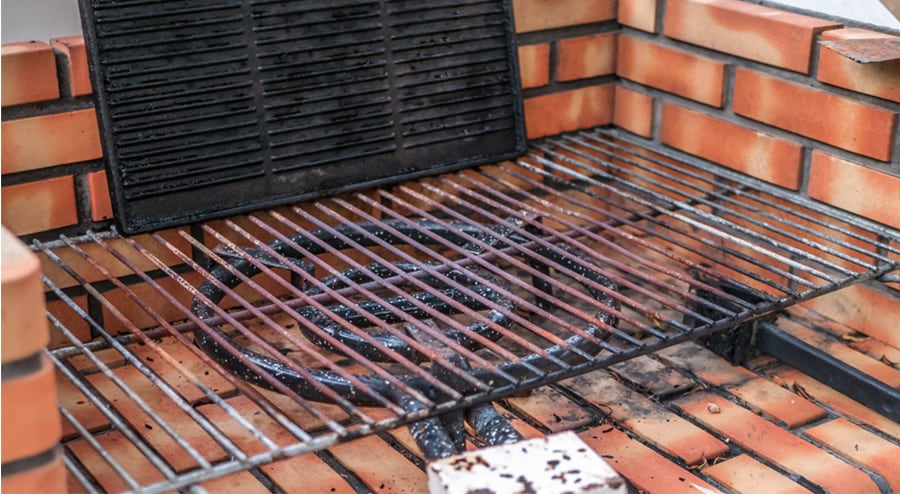Summer is the season of vacations, pool parties, and backyard barbecues. If you aren’t careful, however, a fun family cookout can turn tragic in a split second. Every year there are an estimated 8,900 grill fires at U.S. homes, leading to an average of $110 million in damage to property. While 5,100 of the fires are contained outside, 3,900 of them involve a house or other structure. In addition, grill fires are responsible for about 160 injuries—and 10 fatalities—every year.
Grill fires can get out of control very quickly, so the number one tip for grilling safety is: watch your grill constantly while it’s in use. Beyond that, the following grill safety tips will keep a grilling injury or grill fire from messing up your summer fun.
Types of Grills
There are three main types of grills, and each has its own set of safety issues:
- Charcoal — Uses fire to cook food by burning charcoal briquettes for fuel.
- Gas – Also involves fire. Uses natural gas (often from a permanent gas line) or propane (usually from a portable tank) for fuel.
- Electric – Does not involve fire but does involve electricity. This type of grill cooks food by using grill plates heated by electricity.
Safe Use Tips for Grills
Naturally, most safety tips regarding grills involve fire safety. But grills add grease, explosive gases, and proximity to a house to the mix, so it’s important to be aware of the particular risks and strategies for avoiding these added dangers.
- Place your grill away from your house, porch, garage, awning, deck railing, and landscaping. Never grill inside or in an enclosed area such as a garage, as both charcoal and gas grills produce potentially deadly carbon monoxide gas.
- Don’t wear loose clothing while grilling. In addition, wear oven mitts that extend far up on the forearm as well as a heavy apron. This will provide some protection from burns. And use long handled grilling tools to keep your hands a safe distance from the lit grill.
- Keep children and pets at least 3 feet away from the grill while it is in use.
- Only use lighter fluid that is made for grilling. Do not use any other flammable liquids such as gasoline. If using a charcoal chimney to ignite your charcoal, avoid burns by using a long match.
- Once the fire has started, do not add more lighter fluid. And once the grill is lit, do not try to move it.
- Make sure you have a fire extinguisher within easy reach, and that you know how to use it.
- Never leave your grill unattended.
Cleaning the Grill and Removing and Disposing of Grease
Staying safe while grilling isn’t just a matter of taking care while the grill is in use. Lower the risks of grease fires and other potential problems by taking care of your grill between uses.
- After you have finished grilling, the grill will still be hot for a while. Never try to store or cover your grill while it is hot. Wait till it has cooled before putting it up.
- If you’re using a charcoal grill, always use water to soak your coals before you dispose of them.
- Remove fat build up and grease in the trays under the grill as well as on the grill itself.
Gas Grill Issues
Because propane grills involve highly pressurized flammable gas, you’ll want to be aware of some additional safety issues.
- Propane tanks should be stored outside and away from your home.
- Valves on propane tanks should always be tightly closed when not in use.
- Before every use, check grill hoses for brittleness, holes, and cracks. Check and clear any blockages from the hoses before use. If you find a problem with your hose, don’t panic, and don’t disregard the issue. Most grill hoses can be swapped out with replacement hoses commonly available at hardware stores. If you need help choosing the right one, be sure to ask.
- Check the elements running along the bottom of the grill (where the fire comes out) to make sure there are not cracks or rusted areas that could break.
- If you smell gas while the grill is not lit, turn off the grill and propane tank.
- If you smell gas while the grill is lit, or while cooking, quickly move away from the grill and get everyone a safe distance away, then call the fire department.
Fire Pit Safety
Fire pits are becoming an increasingly popular addition to private outdoor spaces these days, and you may enjoy the convenience (and the romance) of having a neatly contained campfire you can access whenever you want. At the same time, however, keep the following guidelines in mind as you use your backyard fire pit.
- Make sure that your fire pit is at least 10 feet away from your home or any other structure. 25 feet is considered an optimal distance.
- Keep your fire pit away from any low hanging branches, awnings, or porches.
- If you have a movable fire pit or chiminea, avoid placing it on grass or a wooden deck. Fire pits especially should remain over concrete, patio blocks, or some other non-flammable surface.
- Put rocks or dirt around the pit and clear away all flammable vegetation for about five feet.
- Don’t light a fire pit when it is windy.
- Only use a fire starter stick and kindling to start a fire pit fire. Never use lighter fluid.
- To extinguish your fire pit, drown it with water and use a shovel to stir the ashes and ensure the fire is out.
Turkey Fryer Safety
It should be noted that the National Fire Protection Association discourages the use of outdoor turkey fryers that are gas fueled and require that the turkey be immersed in hot oil.
- Do not place outdoor turkey fryers on porches or decks, and never use an outdoor turkey fryer indoors, including a porch, carport, or garage. Keep the turkey fryer away from awnings and low hanging branches on trees.
- Never use the fryer when it is snowing or raining.
- Make sure the fryer is on a level surface and do not move it once you have started using it.
- Follow all the manufacturer’s instructions for use.
- Don’t overfill the tank. Oil that splashes or spills on the hot burner can cause a fire. Make sure, too, that the turkey is completely thawed and dry before you start cooking. Fire flare ups can occur when water or ice mixes with hot oil.
- Wear protective clothing such as long oven mitts and goggles, never leave the turkey fryer unattended, and keep a fire extinguisher nearby.
- When the turkey is finished and has been removed from the pot, remove the pot from the burner very carefully. Place the pot on a solid, level surface, cover, and allow it to cool for at least 8 hours or overnight before disposing of the oil.
Again, authorities recommend against using turkey fryers. But if such a fryer is essential for your holiday traditions, consider purchasing an oil-less fryer that uses infrared heat instead of oil to cook.
Fire Avoidance and Preparation
Whatever cooking you’re doing outside, here are some all-purpose tips that can prevent fires and keep you safe from injury:
- Trim all unnecessary fat from your food before grilling. This will reduce the chance you will have a flare up.
- When marinating meat for the grill, drain the sauce or marinade off before putting it on the fire so that you’re not dripping oil into the flames.
- Control flare ups by moving the meat that is dripping fat or oil directly over the flare up. This will keep the flare-up in one place. Calmly move the other meat to the warming tray or out of the way. Once the grease burns off you can resume grilling.
- Clean your grill regularly according to manufacturer instructions. This will help prevent fires.
- Whether your grill lights from a match or an electric starter, always light the grill with the lid open.
- If you’re using a gas grill and the flames go out for any reason, turn off the gas immediately. Wait 15 minutes before you light it again to avoid a flare caused by unburned gas trapped in the grill.
- Always have a fire extinguisher nearby (or baking soda) for putting out fires. Never use water or flour on a grill fire.
Grills and fire pits are some of the features that make your backyard a pleasant and fun place to be. Don’t let accidents or fires spoil your enjoyment of the outdoors. Practice these safety tips and you can rest easy while enjoying your outdoor spaces to the full.


